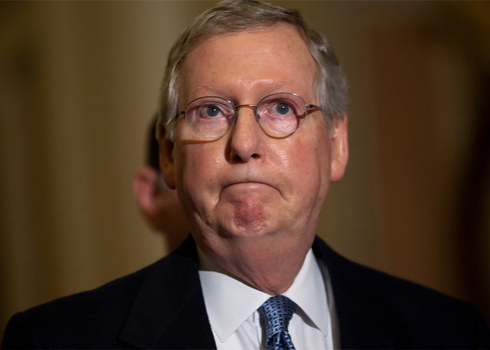Updated 6:45 p.m.
With just over one month left until the government begins to default obligations to creditors, vendors, and entitlement beneficiaries, leaders of both parties in Washington made clear Monday that the underlying gridlock isn’t going anywhere. That means a half-trillion dollar impasse will have to be bridged, quickly, if the country’s to avoid a domino effect of economic consequences. And with the White House and Congressional Republicans staking out incompatible positions, it’s unclear how that will happen.
In the hours before an evening meeting with President Obama, and in a number of different venues, Senate Minority Leader Mitch McConnell renewed his insistence that Republicans will not accept any tax increases as part of a trillion-dollar deficit reduction package the GOP is demanding before agreeing to let the country pay all its bills on time.
But according to a top Democratic aide, Obama and Senate Majority Leader Harry Reid (D-NV) agreed at a White House meeting Monday morning that any such package must take “a balanced approach, and that revenues need to be a part of that approach, especially ending taxpayer-funded giveaways to corporations that don’t need them.”
Democratic aides aren’t offering a complete list of the tax measures they want Republicans to consider, or how much each measure is expected to raise. Multiple accounts, however, indicate they want tax measures to raise $400 billion over the next 10 years — 20 percent of the $2 trillion they hope to cut from the deficit overall.
But McConnell doesn’t really want to touch the tax code to reduce the deficit at all. He made that as clear as ever during his Sunday appearance on This Week. That leaves user fees — a regressive way of raising revenue — and precious else that will get GOP support.
Democrats by contrast are looking at a mix of politically potent, and technical ways of raising revenues.
They’ve already targeted tax preferences for ethanol producers and oil and gas companies, which are expected to cost the Treasury tens of billions of dollars over the next decade.
They’re also hoping to phase out tax deductions for high-income earners, and end a method of accounting that allows businesses to assume the goods they sell are newer than they really are, and thus increase their tax deductions for production costs.
Ending the so-called Last-In, First-Out (LIFO) accounting methods would raise almost $100 billion over 10 years.
Top Democrats didn’t discuss this particular proposal on a conference call with reporters Friday. But GOP-friendly interest groups, including the National Association of Manufacturers, hate the idea.
In addition to ruling out tax increases, McConnell has also insisted that the final debt limit package make deep Medicare cuts. And unlike House Speaker John Boehner, he’s not on the hook in the Senate for raising the debt limit. If he or other Republicans aren’t happy with the menu of items Dems are willing to deal on, he and his caucus can (and have threatened to) leave Senate Dems to raise the debt limit on their own. But that would leave Boehner with the impossible task of squaring a Democrat-only debt limit bill with the demands of his conservative caucus.
All this as the clock ticks down toward a debt default.










